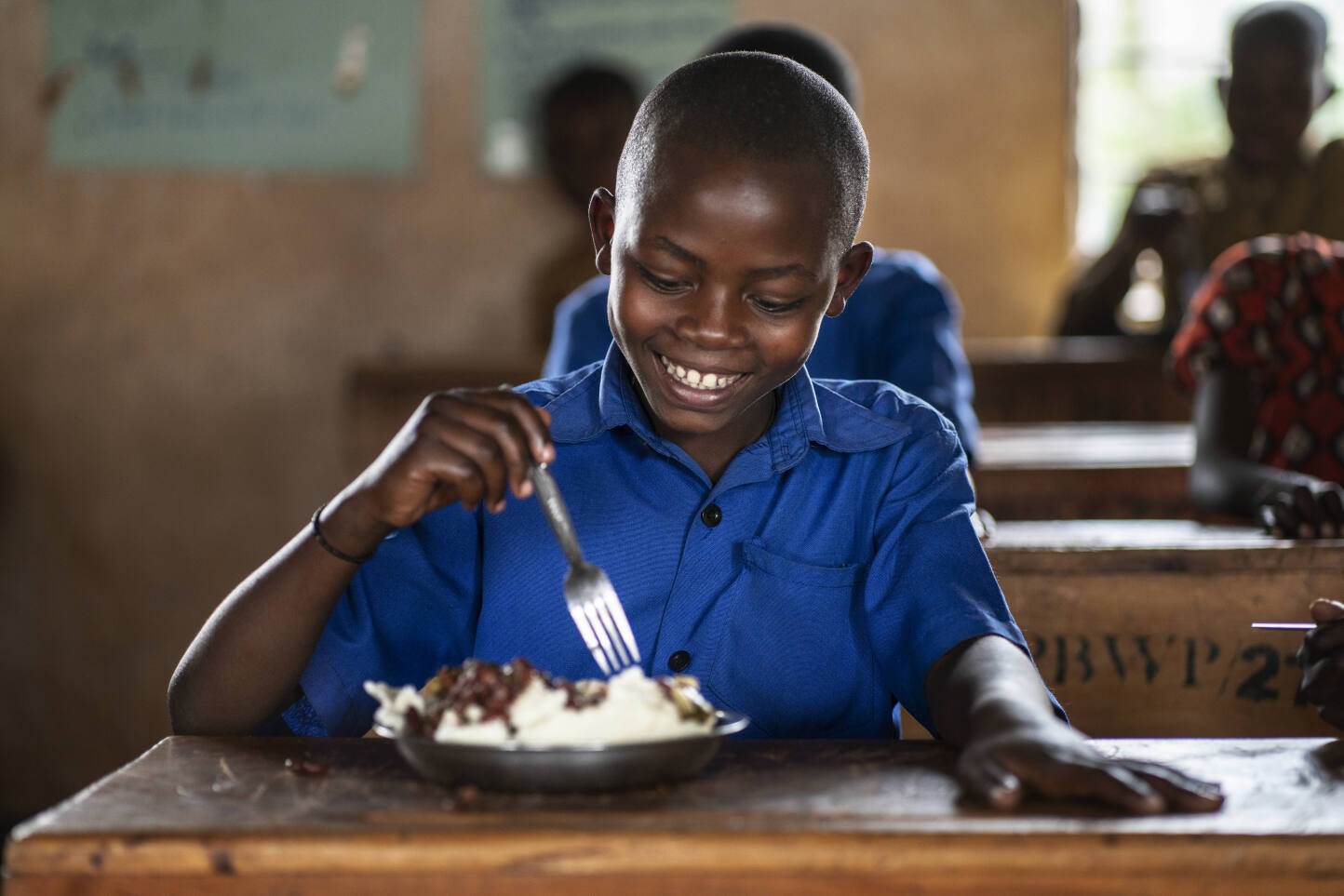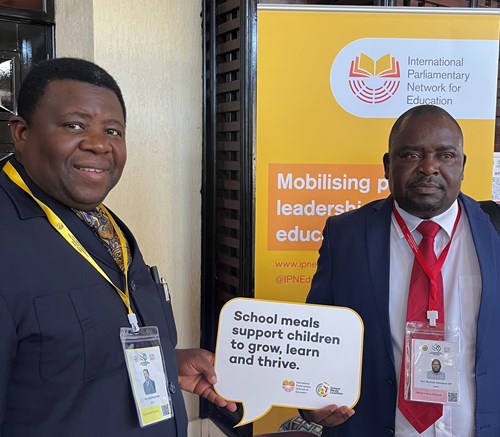
Commonwealth Parliaments are playing a central part in the global drive to provide children with a healthy meal at school every day
The International Parliamentary Network for Education recently published its toolkit for Parliamentarians on campaigning for school meals for all children.
Joseph Nhan-O’Reilly is the Co-Founder and Executive Director of the International Parliamentary Network for Education (IPNEd). The Network was co-founded with Stephen Twigg, Secretary-General of the Commonwealth Parliamentary Association.
When COVID-19 caused the closure of schools, it wasn’t just learning opportunities that children lost out on. In fact, 388 million children were also deprived of the daily meal that they had been receiving at school.
In a remarkable, and all too rare post-COVID turn around, 418 million children are now receiving school meals - 30 million more than prior to the pandemic in 2020.
This momentum is built on growing recognition, backed by strong evidence, that well-designed school meal programmes are one of the most efficient and impactful interventions that governments can support.
Due to multiple challenges that they help solve, they offer exceptionally high returns of between US$7 and US$35 for each US$1 invested.
School meals improve enrolment, retention and learning in school, support children and young peoples’ healthy growth and development, ease the financial pressure on households, can support local food growers and manufacturers, help tackle climate change and improve social cohesion.
For governments looking to improve outcomes for the furthest behind, school meals are particularly appealing, because their benefits are greater for girls, vulnerable groups and communities impacted by conflict and crisis.
The Commonwealth is leading the way
Countries across the Commonwealth are at the leading edge of this agenda. India’s national programme is the world’s largest providing 120 million children in over 1.27 million schools with a daily meal.
Kenya’s programme provides 400,000 daily lunches for children in 225 primary schools and early childhood development centres across the Kenyan capital making it Africa’s largest.
Rwanda is on the path to universal coverage of school feeding for basic education and in 2021 increased its budget from US$8 million in 2020 to US$33 million.
On the other side of the world, in 2023, New Zealand reached a major milestone after the country delivered 100 million free and healthy school meals as part of its healthy school lunches programme.

Above: Rwanda has seen a huge increase in the reach of its school meal programme from feeding 660,000 children a year in 2020 to 3.8 million a year. (Image: IPNEd)
Parliaments are central to progress
In all these cases and many more, Parliaments are proving central: representing community demand for school feeding, legislating to create and where they already exist, improving school meal programmes, approving budgets and monitoring the implementation of government programmes.

Above: Zambian Members of Parliament, Hon. Edgar Sing’ombe, MP and Hon. Misheck Nyambose, MP call for action on school feeding at the 66th Commonwealth Parliamentary Conference in Ghana in October 2023. Hon. Edgar Sing’ombe has argued for more and better financing of school meal programmes in Zambia. (Image: IPNEd)
Representation and advocacy
In Malawi, Hon. Noel Lipipa, MP called for action in supporting NGOs rollout school feeding programmes to vulnerable communities to “shape a brighter future for children”.
In India, Hon. Sonia Gandhi, MP, highlighted the importance of reinstating the midday meal scheme as a matter of urgency after the pandemic, saying “as children return to school they need to be given better nutrition”.

Above: India has the world’s largest school feeding programme, the Midday Meal programme feeds 106 million children at school. (Image: IPNEd)
Legislation
In Canada, Hon. Serge Cormier, MP’s Private Members Bill to create a framework for a national school meal programme helped build cross-party support and preceded the creation of a national school food programme.
The Jamaican Parliament have been central to progress there, endorsing the National School Nutrition Policy and now working with the government to share a White Paper which will inform a new national law.
Budgeting
Policies and programmes rely on efficient and sustained funding, and once again, Commonwealth Parliaments are helping to ensure both.
In Kenya, the Parliament overruled the Treasury and reinstated a large proportion of the school meals budget. The Chair of the National Assembly Budget and Appropriations Committee, Hon. Julius Melly, MP explained: “this Committee has reinstated Sh2bn for this important programme”, citing the vital education and health benefits of the programme.
Similarly, in Trinidad and Tobago, Hon. Ravi Ratiram, MP has called for all the total costs of delivering the school feeding programme to be accounted for in budget calculations and to not leave schools short of funding to implement the mandated programme.
Scrutiny
Members of Parliament are also working to ensure that programmes are being implemented correctly and effectively.
In Sri Lanka, the Parliament’s Ways and Means Committee conducted an assessment of the implementation and financing of the country’s national school meals programme and whether it is achieving the desired benefits.
Meanwhile, in Singapore, Hon. See Jinli Jean, MP questioned the Minister of Education in Parliament on whether their school meals policy was achieving its nutritional goals.
More to be done
22 Commonwealth countries are part of the almost 100 member states that together form the School Meals Coalition. They are all working to grow and improve school meal programmes with the active support of their Parliaments.
At the same time, there is urgent work to be done in other Commonwealth member states where school feeding programmes could make a vital contribution to tackle the triple crisis of less learning, more poverty and worsening nutrition.
An analysis undertaken by the World Food Programme identified that 16 of the 60 countries which should prioritise school meals to populations affected by acute hunger and malnutrition are Commonwealth member states.
Meanwhile, some Commonwealth countries have school meal programmes, but do not reach enough children. Of the 31 Commonwealth countries with school meal programmes for which data exists, 19 provide meals to less than half the children enrolled in primary school and 11 provide meals to less than a fifth.
Seeing first-hand what Parliaments have achieved I know that parliamentary leadership can play a central role in accelerating positive change for children in these places.
A toolkit for Parliamentarians
With that in mind, the International Parliamentary Network for Education recently published ‘School meals: A toolkit for Parliamentarians’.
The toolkit provides MPs with evidence for the case for school feeding alongside actionable guidance on the actions they can take as a Parliamentarian to grow the reach and improve the quality of school feeding programmes.
I hope that our new toolkit will be received enthusiastically by Parliamentarians from across the Commonwealth, and that it will support the creation of a Commonwealth of nations free from hunger and ignorance.
Click to download the International Parliamentary Network for Education's ‘School meals: A toolkit for Parliamentarians’.
